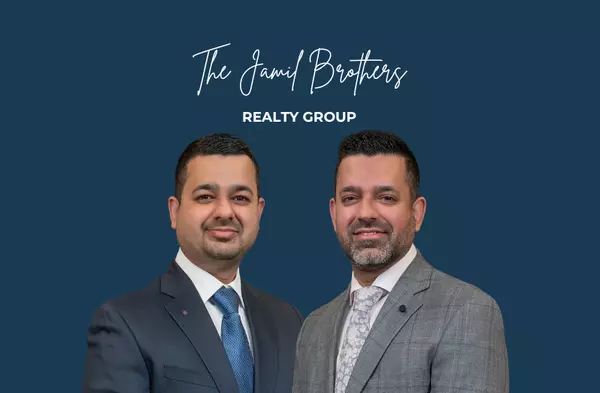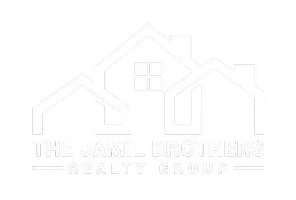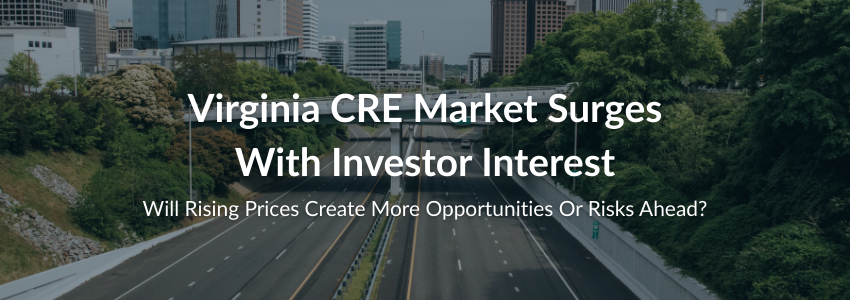Commercial Real Estate Is Up 16%—Can Virginia Keep Up the Pace?
Commercial real estate across America is experiencing unprecedented momentum, with national sales surging 16% in the first half of 2025. From industrial warehouses to mixed-use developments, investors are pouring capital into commercial properties at record levels. But can Virginia's key markets keep pace with this national boom? Smart Virginia property owners are leveraging this commercial surge by working with innovative real estate professionals like our 1.5% full-service listing program to maximize their property values in this dynamic market. This comprehensive analysis reveals how Virginia's commercial real estate landscape is evolving, from Tysons Corner's office towers to Herndon's industrial corridors, and what this growth means for residential property owners, job seekers, and urban planners across the Commonwealth.
Curious About Your Property's Value in This Market?
Our free net sheet calculator shows how current market conditions could impact your property value.
Get My Property AnalysisThe 8 Key Drivers Behind Virginia's Commercial Real Estate Surge
1. Industrial & Logistics Boom
E-commerce fulfillment centers, data storage facilities, and last-mile delivery hubs are driving unprecedented demand for industrial space across Virginia. The Dulles Corridor, stretching from Herndon to Leesburg, has become a logistics powerhouse with Amazon, Microsoft, and Google establishing major operations. Industrial vacancy rates have dropped to historic lows of 2.8% in Northern Virginia.
New construction can't keep pace with demand, pushing industrial lease rates up 18% year-over-year. Properties near Dulles International Airport command premium rents due to cargo access and transportation connectivity. This industrial expansion is creating thousands of jobs and driving residential demand in surrounding communities like Ashburn, Sterling, and Chantilly.
Market Impact: Industrial growth is boosting residential property values within 10 miles of major logistics hubs by 8-12% annually.
2. Multifamily Investment Surge
Apartment complexes and multifamily developments are attracting massive institutional investment as rental demand soars across Virginia's growth corridors. Arlington and Alexandria lead with luxury high-rise developments, while suburban markets like Fairfax and Loudoun County see garden-style apartment construction. Multifamily sales volume increased 22% in the first half of 2025.
Build-to-rent communities are emerging as a new asset class, particularly in Stafford and Prince William Counties where land costs remain attractive. These developments offer single-family home amenities with apartment-style management, appealing to families priced out of homeownership. Average multifamily cap rates have compressed to 4.2% in prime Northern Virginia locations.
Housing Connection: New multifamily supply is helping moderate rent growth while creating construction jobs and supporting local businesses.
3. Mixed-Use Development Revolution
Live-work-play developments are reshaping Virginia's suburban landscape, combining residential, office, retail, and entertainment in walkable communities. Tysons Corner's transformation from suburban office park to urban center exemplifies this trend, with over $8 billion in mixed-use projects completed or under construction since 2020.
The Mosaic District in Merrifield, Reston Town Center expansions, and Pentagon City redevelopment showcase Virginia's embrace of mixed-use urbanism. These projects command premium pricing due to their convenience and lifestyle amenities, attracting both residents and businesses seeking modern, integrated environments.
Simply put: Mixed-use developments create mini-cities where people can live, work, and play without lengthy commutes, making them highly attractive to investors and residents alike.
Urban Planning Impact: These developments reduce traffic congestion while increasing property values in surrounding residential neighborhoods.
4. Office Space Evolution
While traditional office demand remains challenged post-pandemic, Virginia's office market is adapting through strategic repositioning and amenity upgrades. Class A buildings in Tysons, Arlington, and downtown Richmond are commanding premium rents by offering flexible layouts, outdoor spaces, and wellness amenities that attract quality tenants.
Government contractors and technology companies are driving demand for modern office space near Metro stations and major transportation corridors. Sublease availability has stabilized, and flight-to-quality trends favor newer buildings with advanced HVAC systems and collaborative workspaces. Office-to-residential conversions are creating new housing supply in urban cores.
Market Adaptation: Smart office owners are investing in building upgrades and flexible lease terms to attract and retain tenants in the evolving workplace landscape.
5. Data Center Dominance
Northern Virginia hosts the world's largest concentration of data centers, with Loudoun County alone containing over 25 million square feet of data center space. Cloud computing growth, artificial intelligence demands, and 5G infrastructure are driving unprecedented expansion. Major tech companies are investing billions in Virginia data center facilities.
Data centers generate substantial tax revenue for local governments while requiring minimal public services, making them attractive to communities. However, their high electricity demands are driving utility infrastructure investments and renewable energy projects across the region. Land values near fiber optic networks and electrical substations have increased dramatically.
Economic Engine: Data centers support thousands of high-paying jobs while generating tax revenue that funds schools and infrastructure improvements.
6. Retail Reinvention
Virginia's retail landscape is transforming through experiential concepts, medical services integration, and last-mile delivery fulfillment. Traditional shopping centers are being reimagined as community hubs featuring fitness centers, medical offices, restaurants, and entertainment venues alongside traditional retail.
Grocery-anchored centers remain strong performers, while lifestyle centers like Short Pump Town Center and Stonebridge at Potomac Town Center continue attracting investment. E-commerce integration through buy-online-pickup-in-store and micro-fulfillment centers is helping retailers adapt to changing consumer preferences.
Community Benefit: Successful retail centers serve as neighborhood gathering places while providing convenient services and supporting local employment.
7. Healthcare Real Estate Expansion
Medical office buildings, outpatient surgery centers, and specialized healthcare facilities are experiencing robust demand as Virginia's population ages and healthcare delivery evolves. Major health systems like Inova, VCU Health, and Sentara are expanding their footprints through strategic real estate investments.
Urgent care centers, diagnostic imaging facilities, and specialty clinics are locating in convenient suburban locations near residential communities. Healthcare real estate offers stable cash flows and long-term lease terms, making it attractive to institutional investors. Medical office vacancy rates remain below 8% across most Virginia markets.
Quality of Life: Expanded healthcare facilities improve community access to medical services while supporting high-skilled job creation.
8. Infrastructure Investment Impact
Major transportation and utility infrastructure projects are catalyzing commercial real estate development across Virginia. The Silver Line Metro extension to Dulles Airport, I-495 Express Lanes expansion, and Route 28 improvements are creating new development opportunities and increasing property values along these corridors.
Broadband expansion, electrical grid upgrades, and water/sewer capacity improvements enable higher-density development in previously constrained areas. Public-private partnerships are funding infrastructure improvements that support both commercial development and residential growth throughout the region.
Long-term Value: Infrastructure investments create lasting benefits that support sustained commercial and residential property appreciation.
Want to understand how these trends affect your property value?
Calculate My Property ValueVirginia's Commercial Real Estate by the Numbers
Here's how Virginia's key commercial markets are performing in 2025, showing the momentum behind the Commonwealth's economic growth:
| Market Segment | 2025 Growth Rate | Key Virginia Hubs |
| Industrial/Logistics | +24% | Herndon, Sterling, Ashburn |
| Multifamily | +22% | Arlington, Alexandria, Fairfax |
| Mixed-Use | +19% | Tysons, Reston, Pentagon City |
| Data Centers | +18% | Loudoun County, Prince William |
| Healthcare | +15% | Richmond, Norfolk, Fairfax |
| Office (Class A) | +8% | Tysons, Arlington, Richmond |
| Retail (Experiential) | +12% | Short Pump, Stonebridge, Potomac Mills |
| Overall CRE Growth | +16% | Statewide Average |
Source: Virginia Commercial Real Estate Market Report, Q2 2025. Growth rates reflect transaction volume increases compared to 2024. Individual market performance may vary by specific location and property type.
10 Ways Commercial Growth Impacts Virginia Homeowners
- Job Creation & Income Growth: New commercial developments generate thousands of high-paying jobs, increasing household incomes and housing demand
- Property Value Appreciation: Proximity to major employers and commercial centers drives residential property values up 8-15% annually in key corridors
- Infrastructure Improvements: Commercial tax revenue funds road improvements, schools, and public services that benefit all residents
- Retail & Service Expansion: New commercial development brings restaurants, shopping, and services closer to residential neighborhoods
- Transportation Enhancements: Major employers advocate for and fund transportation improvements that reduce commute times for everyone
- Tax Base Diversification: Commercial properties generate substantial tax revenue, potentially reducing residential tax burdens
- Construction Employment: Building boom creates jobs for contractors, tradespeople, and construction workers throughout the region
- Housing Demand Pressure: Job growth increases housing demand, benefiting existing homeowners but challenging first-time buyers
- Urban Planning Evolution: Mixed-use development creates walkable communities that enhance quality of life and property desirability
- Economic Resilience: Diverse commercial base makes Virginia's economy more resilient to economic downturns and industry changes
Wondering how these trends might affect your property's future value?
Explore Your OptionsVirginia's Competitive Advantages
- Strategic Location: Proximity to Washington DC provides access to federal agencies, contractors, and international organizations
- Educated Workforce: Virginia ranks among the top states for educational attainment, attracting knowledge-based industries
- Transportation Infrastructure: Major airports, ports, highways, and rail connections support logistics and business operations
- Business-Friendly Environment: Competitive tax rates, streamlined permitting, and pro-business policies attract corporate investment
- Quality of Life: Strong schools, cultural amenities, and natural beauty help companies attract and retain talent
- Technology Ecosystem: Established tech sector and data center infrastructure support innovation and growth
Ready to Capitalize on Virginia's Growth?
Get expert guidance on how commercial real estate trends could impact your property decisions.
Schedule your complimentary market consultation today
Call: (703) 375-9583Virginia Commercial Real Estate FAQ
How does commercial real estate growth affect residential property values?
Commercial development typically increases residential property values through job creation, improved infrastructure, and enhanced amenities. Properties within 5-10 miles of major commercial developments often see 8-15% annual appreciation. However, some industrial developments may create traffic or noise concerns that require careful urban planning to mitigate.
Bottom line: Well-planned commercial growth generally benefits residential property owners through increased demand and improved community amenities.
Which Virginia markets offer the best commercial real estate opportunities?
Northern Virginia leads in data centers and government contracting, while Richmond and Norfolk offer diverse opportunities in healthcare, finance, and logistics. The I-95 and I-64 corridors provide excellent transportation access for industrial development. Emerging markets like Fredericksburg and Winchester offer lower entry costs with strong growth potential as the DC metro area expands.
What should residential property owners know about nearby commercial development?
Stay informed about zoning changes and development proposals in your area, as they can significantly impact property values and quality of life. Participate in local planning meetings to understand proposed projects and voice any concerns. Consider how new commercial development might affect traffic patterns, school enrollment, and community character when making long-term property decisions.
How can homeowners benefit from Virginia's commercial real estate boom?
Homeowners can benefit through increased property values, job opportunities, and improved local amenities. Consider timing property improvements or sales to capitalize on market momentum. Some homeowners explore investment opportunities in commercial real estate through REITs or partnerships. Stay informed about infrastructure improvements that could enhance your property's accessibility and value.
What role does transportation play in Virginia's commercial success?
Virginia's strategic location between major East Coast markets, combined with excellent port facilities, airports, and highway systems, makes it attractive for logistics and distribution operations. The Silver Line Metro extension and planned transportation improvements continue to enhance accessibility. Properties near major transportation hubs typically command premium values and attract quality commercial tenants.
How can I stay informed about commercial developments affecting my area?
Follow local government planning departments, attend county board meetings, and subscribe to commercial real estate publications like Washington Business Journal. Many counties offer email alerts for development proposals and zoning changes. Working with knowledgeable real estate professionals who track market trends can help you understand how commercial developments might impact your property value and investment decisions.
Essential Resources for Virginia Property Owners
Get Your Free Property Valuation - Discover how market trends are affecting your Virginia property value
1.5% Listing Program - Maximize your proceeds with innovative real estate services
Current Market Data - Latest trends and analysis for Virginia's commercial and residential markets
Calculate My Net Proceeds - See how current market conditions could impact your property sale
"1.5% listing service" refers to the listing-side brokerage fee only; any seller-offered buyer-broker compensation (if any), brokerage/admin fees, and all third-party charges (title/lender/HOA/recording, inspections, warranties, etc.) are separate. Minimums and exclusions may apply; see the listing agreement and the Important Information & Disclosures.
Important Information & Disclosures
Last updated: August 26, 2025
Content on this page is provided for general educational purposes for property owners in Virginia and should not be relied upon as legal, tax, accounting, or financial advice. Consult your attorney, CPA, lender, and title company for advice specific to your situation.
- Market Analysis Only: Commercial real estate statistics and trends reflect general market conditions as of August 2025 and may change without notice. No guarantee is made regarding future market performance or property values.
- Brokerage Compensation & 1.5% Listing Service: Commissions are not set by law and are fully negotiable. The "1.5% listing service" refers solely to the listing-side brokerage fee. Any seller-offered buyer-broker compensation (if any), brokerage/admin fees, and all third-party charges are separate. Minimum fees and program exclusions may apply; full details are provided in the written listing agreement.
- Accuracy & Corrections: Information is provided "as-is" and, while believed accurate, may contain errors or omissions. If you see an error, please contact us for prompt correction.
- No Agency Created: Viewing this page, contacting us, or submitting a form does not create an agency relationship. Representation begins only upon mutual execution of a written agreement.
- Fair Housing: We conduct business in accordance with the Fair Housing Act. Equal Housing Opportunity.
- Advertising: Advertising is provided by Samson Properties, main office Chantilly, VA. Team: The Jamil Brothers Realty Group.
- Not a Solicitation: Not intended to solicit homeowners currently under an exclusive representation agreement with another broker.
Where market statistics or commercial real estate data are referenced, they are deemed reliable but not guaranteed; availability and terms are subject to change.
Categories
Recent Posts


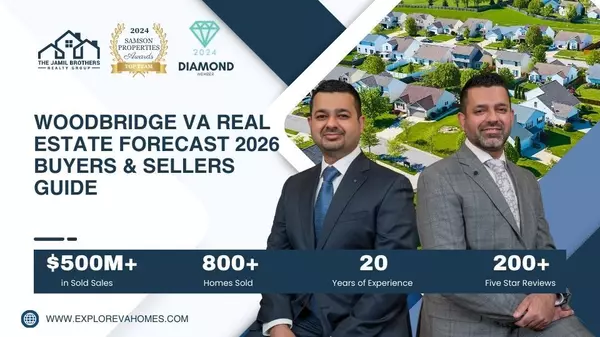

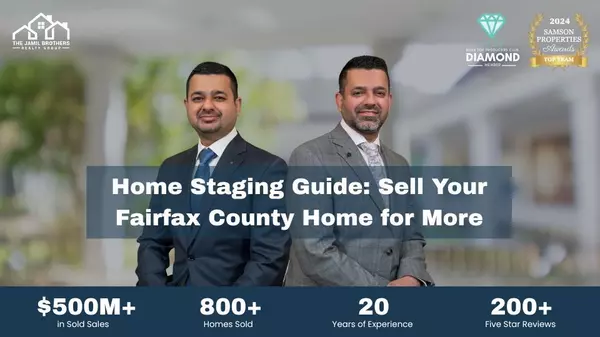
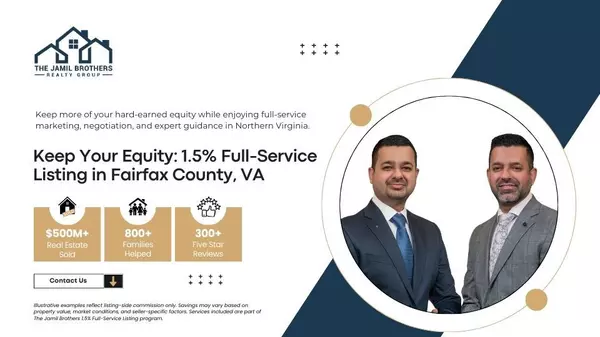

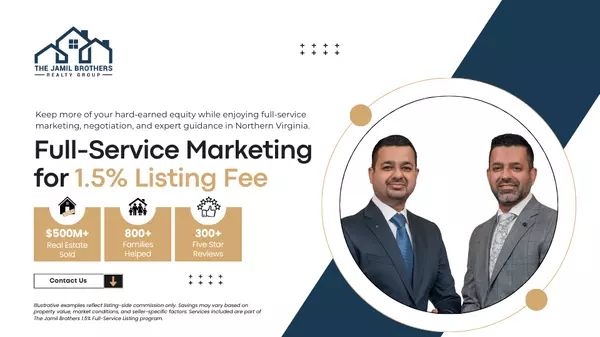


Let's Connect
